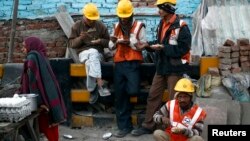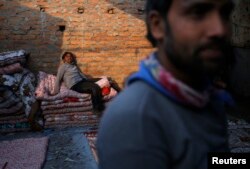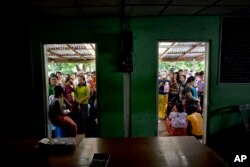A new U.N. report on labor and migration in Asia Pacific says economic gains from migration are often overlooked and is calling for policies promoting greater regional cooperation or risk heightening inequalities and human rights abuses.
Globally in 2013 there were more than 213 million migrants worldwide with over 59 million living in the Asia Pacific region, marking a growing trend since 1990.
Role of migrants
The U.N. report released this week says worldwide, over 95 million migrants came from countries in the Asia Pacific region; a rise of almost 50 percent over the past two decades. And, the report indicated, this trend is set to continue.
Hongjoo Hahm, deputy executive secretary of the U.N.’s Economic and Social Commission for Asia and the Pacific (UNESCAP) said the main driver propelling migration in the region is economics.
“Economic gains is why migrants are on the move and we see the migrants largely moving unlike in other regions of the world. In Asia, one of the biggest and unique characterization is migration occurring from South to South except to say those going to the Gulf [oil] countries,” he said.
Each year, some two million Filipinos depart for work overseas. More than half a million workers leave Bangladesh, India, Indonesia and Pakistan annually.
Key destination countries for many include Brunei Darussalam, Kazakhstan, Malaysia, Maldives, the Russian Federation, Singapore and Thailand.
Social and economic development
But restrictions imposed on migrant workers in some host countries impact migrant rights and limit their access to social protections. The U.N. report says such restrictions are often economically unjustified and are harmful to human rights.
UNESCAP’s Hongjoo said issues such as migrants’ direct impact on local wages and inequality was also found to be quite small.
“What we do find on the other hand is the impact on wages, on inequality and employment is mostly predominantly determined and is a function of government policies – not on migrants, stated Hongjoo. "When you provide migrants with decent work, when you treat migrants as your own, assimilate them into your economy and treat them as national labor – it really benefits your national economy.”
But Phil Robertson, Asia Pacific deputy director for Human Rights Watch, said regional governments, such as Malaysia, prefer “short term” irregular migration, leaving many migrants in the irregular or underground economy faced with little protection.
“Through all these issues is an exaggerated sense of national security that somehow these refugees and migrants constitute some sort of threat to their countries," he explained. "You see this in Thailand, where there’s often reference to migrants or refugee mobs, you see this in Malaysia where there’s an effort to try to continues to keep refugees out of the formal economy, not giving them the right to work.”
Robertson said Southeast Asia’s ASEAN Economic Community (AEC) has also failed to formulate region-wide migrant work polices to mirror existing agreements covering goods and services.
U.N. economists say migrant trends in the future will also be influenced by regional demographic changes, especially in areas of an aging population, with a call for regional policies based on respect for human rights, decent work and social protection both for nationals as well as migrants.






